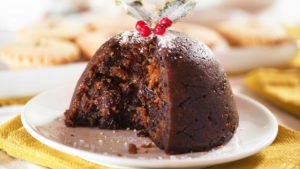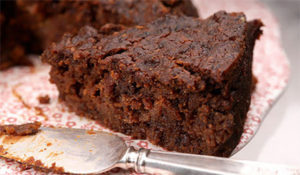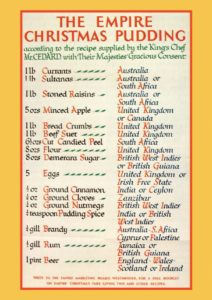In Caribbean culture, to give a whole home-baked black cake as a gift is a sign of great affection and intimacy. But have you ever thought about the origin of black cake?

According to Guyanese historian Sushima Naraine, who resides in Canada, black cake is the Caribbean version of the British dessert plum pudding, but with “some slight Caribbean-esque changes(hence the rum)”.
Food and Cooking in Victorian England: A History stated: “Banned by the Puritans in the 1660s for its rich ingredients, the [plum] pudding and its customs came back into popularity during the reign of George I. Known sometimes as the Pudding King, George I requested that plum pudding be served as part of his royal feast when he celebrated his first Christmas in England after arriving from Hanover to take the throne in 1714. By 1740, a recipe for ‘plum porridge’ appeared in Christmas Entertainments. In the Victorian era, Christmas annuals, magazines, and cookbooks celebrated the sanctity of family as much as the sanctity of Jesus’ birth, and the tradition of all family members stirring the pudding was often referenced…Poorer families made the riches version of plum pudding that they could afford…Even workhouse inmates anticipated a plum pudding on Christmas Day.” Andrea Broomfield [Praeger:Westport CT] 2007 (p. 150-151)
“While Christian missionaries made their ways through Caribbean communities, they left an indelible mark in the foods that continue to be a staple of the Caribbean diet. Plum pudding is but one example of the remaining British presence throughout.

“It’s impossible to have a Christmas without black cake especially because many people gift these cakes to each other. As well, it’s common for everyone in the family to get involved in the actual baking process. Dad might be in charge of soaking the fruits in the rum, while mom takes care of mixing the ingredients. All the children – if they can be trusted with this task – would be involved in mixing the icing. The prep for baking black cakes is time-consuming, but the results are always amazing. As well, because of the concentration of rum these cakes can last for a really long time – my family keeps black cake on the kitchen counter for months afterwards…” Sushima noted.
Interestingly, the cake went by another name – the Empire Christmas pudding. This dessert was a staple of the British Empire and, of course, a special cake made and eaten during the Christmas holidays. It gained popularity during the Victorian era when chefs were able to preserve fruits from summer and use them during the winter.
“The Empire Christmas Pudding”, an artwork by F C Harrison produced for the Empire Marketing Board, is a recipe from 1926-1939 showing various ingredients being sourced from different countries, including sugar and rum from British Guiana.

English cakes were soaked in liquor to preserve them on sea voyages. But according to Jessica B. Harris, a culinary historian, black cake’s Caribbean character is found in the rum (British cakes usually use brandy) and in the cake’s intensely dark colour.
Black cake reflects the British presence in the Caribbean. The brown sugar, molasses and rum are reminders that it was the quest for sugar, and the slave labour that harvested it, that kept British colonialists in the islands.



